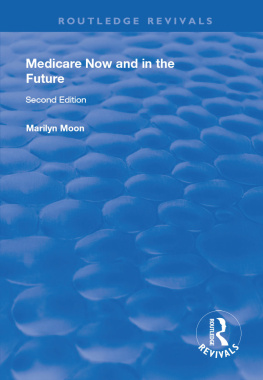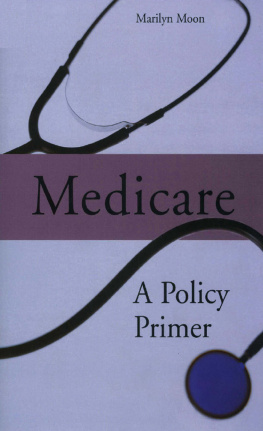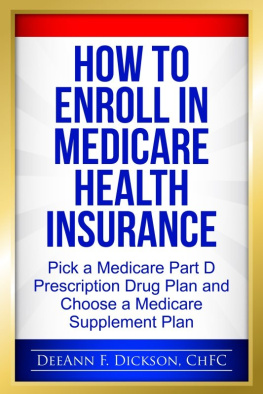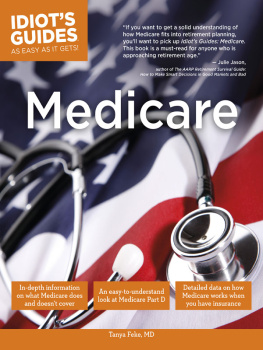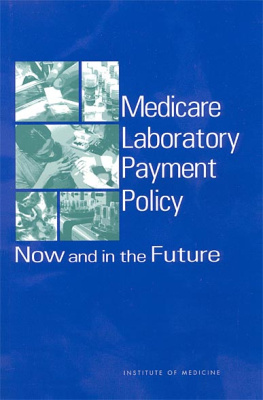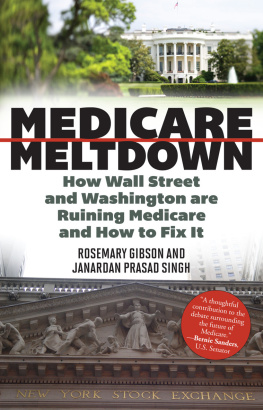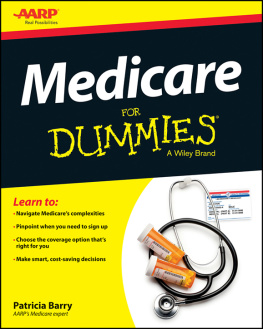MEDICARE NOW AND IN THE FUTURE
Second Edition
Medicare Now and in the Future
Second Edition
MARILYN MOON
Published in association with
The Urban Institute Press
First published 1997 by association with The Urban Institute Press by Ashgate Publishing
Reissued 2018 by Routledge
2 Park Square, Milton Park, Abingdon, Oxon OX14 4RN
711 Third Avenue, New York, NY 10017, USA
Routledge is an imprint of the Taylor & Francis Group, an informa business
Copyright The Urban Institute 1997
All rights reserved. No part of this book may be reprinted or reproduced or utilised in any form or by any electronic, mechanical, or other means, now known or hereafter invented, including photocopying and recording, or in any information storage or retrieval system, without permission in writing from the publishers.
Notice:
Product or corporate names may be trademarks or registered trademarks, and are used only for identification and explanation without intent to infringe.
Publishers Note
The publisher has gone to great lengths to ensure the quality of this reprint but points out that some imperfections in the original copies may be apparent
Disclaimer
The publisher has made every effort to trace copyright holders and welcomes correspondence from those they have been unable to contact.
A Library of Congress record exists under LC control number: 98159087
ISBN 13:978-1-138-32459-6 (hbk)
ISBN 13:978-0-429-45078-5 (ebk)
BOARD OF TRUSTEES
Richard B. Fisher
Chairman
Katharine Graham
Vice Chairman
Joel L. Fleishman
Vice Chairman
William Gorham
President
Jeffrey S. Berg
Joan Toland Bok
Marcia L. Carsey
Carol Thompson Cole
Richard C. Green, Jr.
Fernando A. Guerra, M.D.
Jack Kemp
Ann McLaughlin
Robert S. McNamara
Charles L. Mee, Jr.
Robert C. Miller
Hugh B. Price
Sol Price
Robert M. Solow
Dick Thornburgh
LIFE TRUSTEES
Warren E. Buffett
James E. Burke
Joseph A. Califano, Jr.
William T. Coleman, Jr.
John M. Deutch
Anthony Downs
Eugene G. Fubini
George J. W. Goodman
Aileen C. Hernandez
Carla A. Hills
Vernon E. Jordan, Jr.
Edward H. Levi
Bayless A. Manning
Stanley Marcus
David O. Maxwell
Arjay Miller
J. Irwin Miller
Lois D. Rice
Elliot L. Richardson
William D. Ruckelshaus
Herbert E. Scarf
Charles L. Schultze
William W. Scranton
Cyrus R. Vance
James Vorenberg
Mortimer B. Zuckerman
THE URBAN INSTITUTE is a nonprofit policy research and educational organization established in Washington, D.C., in 1968. Its staff investigates the social and economic problems confronting the nation and public and private means to alleviate them. The Institute disseminates significant findings of its research through the publications program of its Press. The goals of the Institute are to sharpen thinking about societal problems and efforts to solve them, improve government decisions and performance, and increase citizen awareness of important policy choices.
Through work that ranges from broad conceptual studies to administrative and technical assistance, Institute researchers contribute to the stock of knowledge available to guide decision making in the public interest.
Conclusions or opinions expressed in Institute publications are those of the authors and do not necessarily reflect the views of staff members, officers or trustees of the Institute, advisory groups, or any organizations that provide financial support to the Institute.
When the first edition of Medicare Now and in the Future was published, many were predicting that reform of Medicare would be part of a comprehensive restructuring of the nations healthcare systempublic and private. For that reason, one of Marilyn Moons major goals in her previous book was to help readers focus on Medicare in the context of broader health system reform. Three years later, such comprehensive reform no longer appears imminent.
As interest in system reform has waned, however, the focus on reforming Medicare has increased, simply because, in a political climate of budget balancing and government downsizing, its size makes it a major candidate for cuts. Moon takes the occasion of the 30th anniversary of Medicares first beneficiary payment to take another hard look at the program. Recognizing the constraints imposed by the current budget climate and an aging population, she discusses how the Medicare budget can be tightened, and providers and beneficiaries made more cost-conscious in their use of care, without threatening the well-being of elderly and disabled Americanstwo vulnerable populations whose major source of acute care is the Medicare program.
Her fundamental point is that better targeting can lead to budget savings without threatening quality of care. Large cuts are possible in some areas, in her judgment, if they are combined with selective increases in others. Across-the-board cuts are never the right answer.
A major focus of Moons new book is the issue of means-testingmaking better-off beneficiaries pay more for their care. As is true for the rest of the population, the gap between rich and poor among the elderly is growing. The Medicare trust fund faces bankruptcy by the year 2001 and the proportion of the nonelderly without insurance protection, particularly children, is rising. These are times when it is essential to revisit the original premise of the Medicare program that elderly and disabled Americans should be entitled to healthcare protection without regard to income differences. Moon provides a detailed analysis of the kinds of increased financial burdens the elderly can reasonably be expected to bear and those they cannot.
Because reform of the Medicare programwhich now accounts for over 10 percent of the federal budgetwill almost inevitably be a prominent part of the budget debate for years to come, the issues discussed in this book are important in a policy arena that stretches beyond healthcare reform. It is my hope that Moons considered treatment of them will illuminate what is often a heated rather than enlightening debate.
William Gorham
President
July, 1996
The first edition of this monograph fulfilled a long-term ambition of mine to write in depth about the Medicare program. I have been working on Medicare issues since 1981 and found that there was little in the literature that described the program or recognized its complexitiesissues that are crucial to a reasonable debate over changes that need to be made over time. And although there has been little in the way of substantive legislative change in the Medicare program since 1992 when most of the work on the first edition was underway, a number of factors have now dated this edition. The rate of growth of spending on Medicare, for example, has been such that the numbers from the first edition are now out of date.
And even more important is the changing context of the healthcare environment of which Medicare is a part. Enthusiasm for healthcare reform for the younger population was very strong; in fact, some advocates of reform even suggested using the Medicare program as the basis for systemwide reforms. Times have changed substantially in just four short years, however. Suspicion of government programs is highalthough Medicare remains popular. And both sides of the political aisle now talk about reducing the size of government overall. Further, the Medicare program is insufficiently financed for the near term and will later face even greater challenges from the aging of our population.



